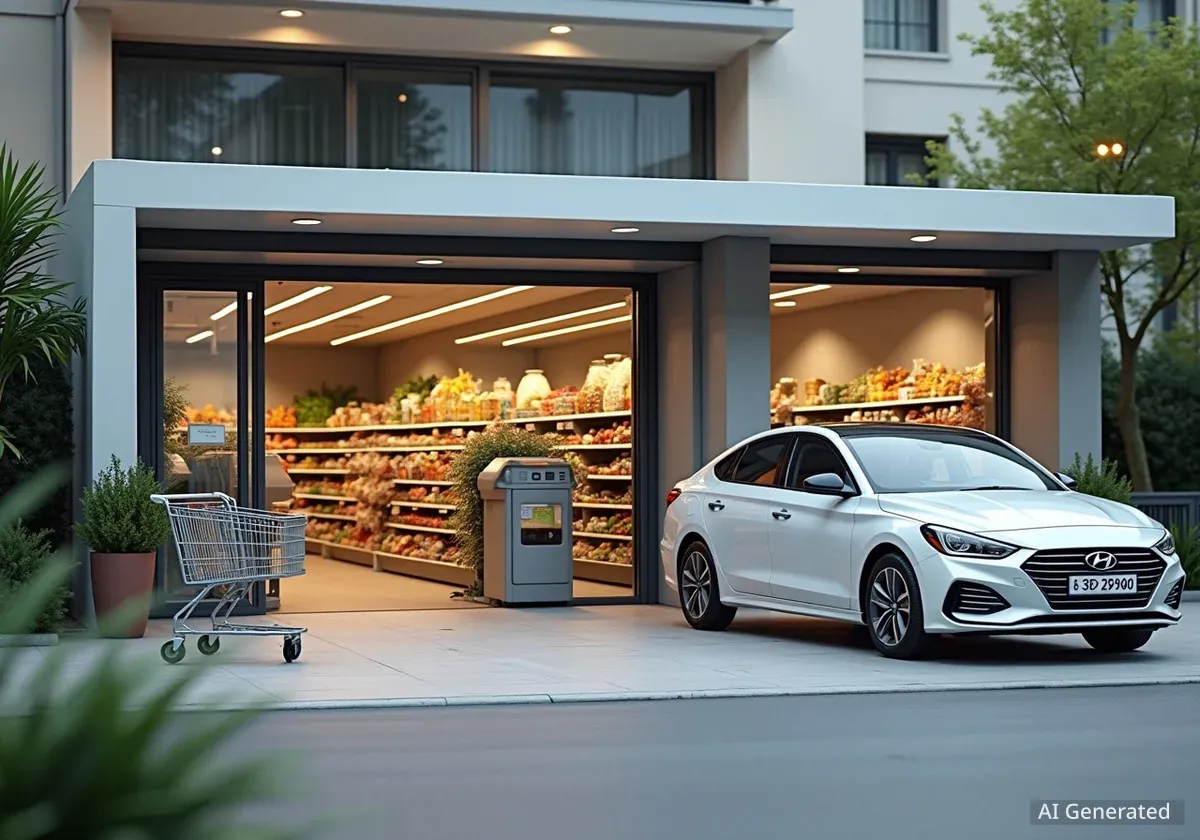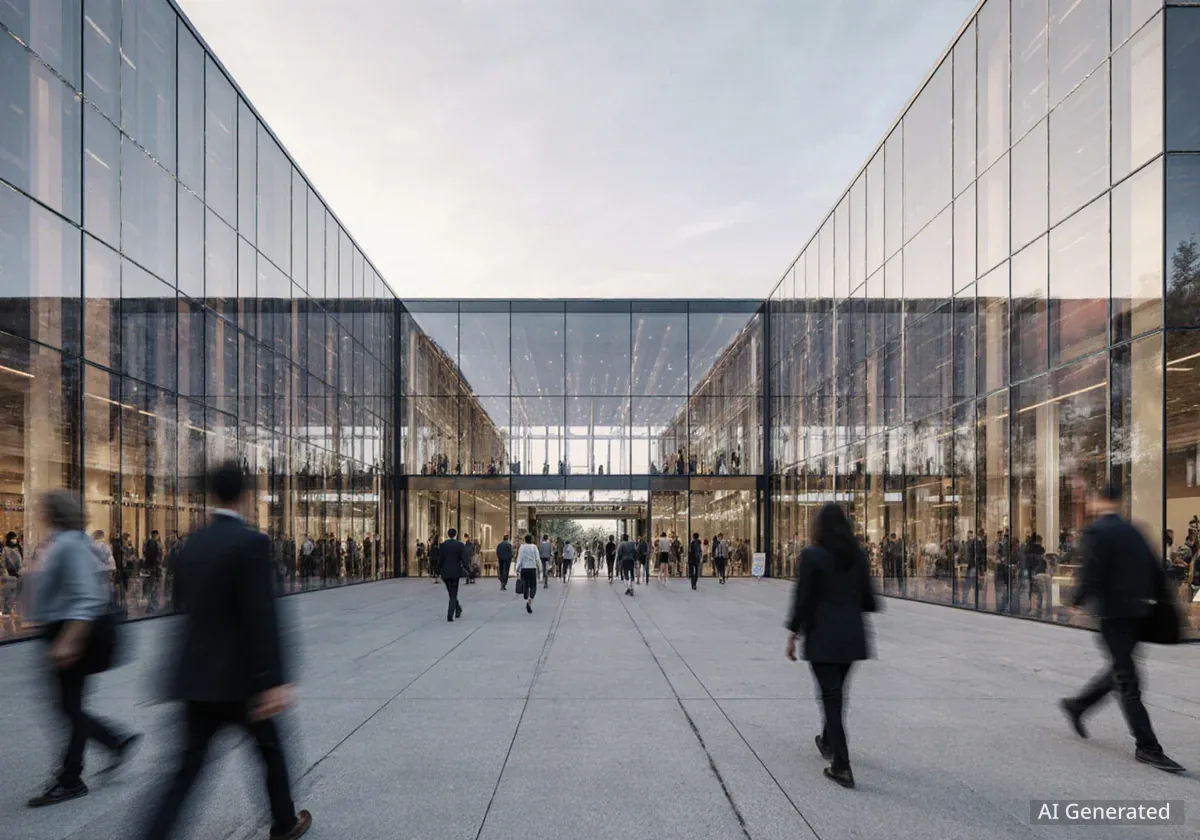BJ's Wholesale Club, a major operator of membership-based warehouse stores in the Eastern United States, is expanding its business model by testing new, smaller-format grocery stores and adding car wash services. This strategic shift involves repurposing vacant retail spaces and introducing new amenities to better serve its members and compete in a changing market.
The company, which runs approximately 250 large warehouse clubs, has launched a grocery-focused concept called BJ's Market and recently filed plans to build its first car wash, signaling a broader strategy to diversify its real estate portfolio and service offerings.
Key Takeaways
- BJ's Wholesale is launching smaller grocery stores, called BJ's Market, to supplement its large warehouse clubs.
- The first BJ's Market opened in a repurposed 43,000-square-foot former Toys R Us building in Rhode Island.
- The company is also adding car washes, with the first planned for its Southington, Connecticut, location.
- These moves follow similar strategies by competitors Costco and Sam's Club, which already operate gas stations and car washes.
A New Approach to Retail Growth
BJ's Wholesale Club is known for its expansive warehouse locations, which average around 100,000 square feet. These clubs, located across 21 states, primarily offer bulk items ranging from fresh foods and household essentials to electronics and seasonal goods. However, the company is now exploring new avenues for growth that extend beyond its traditional large-format model.
This diversification strategy appears focused on adding convenience and value for its members. By introducing smaller, more accessible grocery stores and adding services like car washes, BJ's aims to increase customer engagement and capture a larger share of their regular spending.
Adapting to the Retail Landscape
The move to repurpose existing real estate is a significant trend in the commercial property market. As legacy retailers like Toys R Us and Winn-Dixie have downsized or closed, landlords and new tenants are finding creative ways to utilize these large, well-located buildings. BJ's strategy taps into this trend, allowing for faster expansion into established neighborhoods.
The company's leadership has framed these experiments as a way to innovate and understand customer needs better. These new formats serve as testing grounds for concepts that could potentially be rolled out more broadly across its network.
The BJ's Market Experiment
The most prominent example of this new strategy is BJ's Market, a smaller grocery store concept. The first location opened in 2022 in Rhode Island, marking a significant departure from the company's usual warehouse scale.
Repurposing Vacant Retail Space
For its first BJ's Market, the company took over a 43,000-square-foot building that was previously a Toys R Us. At less than half the size of a typical BJ's club, this format allows the company to enter markets where a full-size warehouse might not be feasible.
A second BJ's Market is planned for Delray Beach, Florida. This location will occupy a former Winn-Dixie grocery store, which spans approximately 53,000 square feet. This continued use of repurposed retail space highlights an efficient and cost-effective expansion strategy.
What the Market Offers Members
Despite its smaller size, BJ's Market is designed to offer the core benefits of a BJ's membership. The stores stock the chain's most popular food products, including a full-service deli, fresh produce, and bakery items. Importantly, the pricing and package sizes are the same as those found in the larger warehouse clubs.
To maintain the familiar club experience, these markets also feature popular elements like product demonstrations and food sampling stations. Company executives have described the concept as an essential part of their growth plan.
Company executives refer to BJ’s Market as an “innovation lab for BJ’s Wholesale Club” that also provides club members with another store option that is convenient and close to their homes.
The goal is to create a more convenient shopping option for members who may not need to visit a full-size warehouse for every trip, potentially increasing the frequency of their visits.
Adding Convenience with Car Washes
In addition to its grocery store initiative, BJ's is venturing into another service-oriented business: car washes. This move builds on its existing network of gas stations, which are already present at roughly 75% of its 250 club locations.
Last month, the company submitted plans to develop its first car wash in the parking lot of its club in Southington, Connecticut. The proposed structure is a 4,800-square-foot building that will house the car wash equipment, a mechanical room, an office, and two canopied pay stations.
Competitor Comparison
- Sam's Club: Operates car washes at more than 40 of its club locations.
- Costco: Has car washes at 15 clubs across 5 states.
- BJ's Wholesale: Currently planning its first car wash facility.
While BJ's has not yet released details about pricing, subscription options, or whether the service will be exclusive to members, the development follows a well-established model used by its main competitors.
Following Competitor Footsteps
Both Sam's Club and Costco have successfully integrated car washes into their offerings for years. Sam's Club has a significant presence with over 40 locations, while Costco operates them at 15 of its warehouses. This demonstrates a proven demand for such services among warehouse club members, who are often looking to consolidate their errands.
While Costco has included car washes in some of its new development projects, it reportedly does not plan to add them to most existing sites. This may present an opportunity for BJ's to differentiate itself and attract members by offering an additional layer of convenience at more of its locations over time.
Future Possibilities for Expansion
The development of smaller grocery stores and car washes may only be the beginning of BJ's strategic evolution. As the company seeks to add more value for its members, other business lines and real estate projects could be considered.
One area of speculation is a potential return to the pharmacy business. BJ's operated in-club pharmacies in the past but exited the business in 2007. Meanwhile, both Costco and Sam's Club have continued to expand their pharmacy services, which are a major draw for members.
The Pharmacy Question
Recent events in the pharmacy industry could create a compelling opportunity. The bankruptcy of Rite Aid has resulted in the closure of hundreds of stores, leaving a significant gap in the market for other retailers to fill. Some regional grocers, like Giant Eagle in Pittsburgh, are actively expanding their pharmacy services and even taking over former Rite Aid real estate.
BJ's has not made any public statements about re-entering the pharmacy sector or acquiring former drugstore properties. However, as the company continues to experiment with new formats and services, leveraging its existing customer base with health and wellness offerings could become a logical next step in its ongoing transformation.





